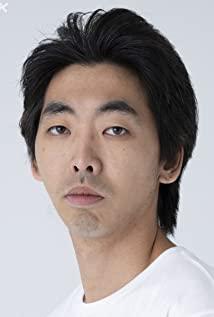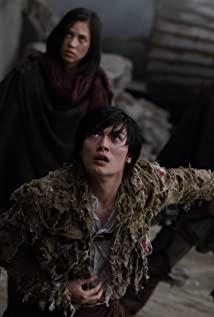2. The director is always in a hurry
3. The director makes some strange choices
4. The ending
1. The part of Muyue is really inexplicable.
For viewers who haven't read the book to watch this movie, it's really hard to feel what kind of person Kiyuki is, what role he played in the relationship between Watanabe and Naoko, and why he committed suicide. When Mu Yue tossed the exhaust pipe of the car suddenly appeared on the screen, I was worried for those who watched the movie directly. Would it be too inexplicable? Although the book does not clearly explain the reason for Muyue's suicide, but there was a special atmosphere of arrogance and arrogance in Muyue before, and if Watanabe asked in the book: Why are you so serious today, Muyue smiled with satisfaction, "Today I don't want to lose." After the performance, the audience could at least feel that something different from usual was going to happen. But no. There are billiards, but Watanabe just smiled mildly and said that if I lose, I will pay. Can this play the role of the paragraph in the book? Or does the director think that Muyue's expression alone can tell that he is more serious than usual? I can only say that it's really hard to see this from the actor's dazed and hesitant face.
And don't say that the length of the film is limited, the previous part of the three people getting along, not so many people in the big background silent or small walks, can't you? There are also Kiyuki and Watanabe holding a popsicle stick to compare swords or something. . . . speechless. Is this the way the three of them get along in the book? The scene at the beginning is too ordinary, any youth film can be used, and what Naoko Kiyuki Watanabe constitutes should be a special small world, which will be so devastating to the remaining people because of its disappearance. blow. Couldn't the process of Muyuki's suicide in the end be omitted? It is necessary to carefully play how he starts the engine, how to cough, how to climb from the front row to the back seat? The audience even feels vague about this person, will they care about how he died? Instead of spending so much time acting on these, it is better to add some more dialogue scenes to make the characters and relationships more vivid. After all, it is Mu Yue's death that caused everything that follows. This is the basis of an emotion.
2. The director is always is in a hurry
Most of the plot and pictures flow fast forward without giving you a careful look. The characters also came out suddenly, like the death squad, like Yongze, like Midori. The conversation between Midoriko and Watanabe in the book is abrupt enough, but there is still a reason for borrowing notes. There is no mention of notes in the movie, which makes people feel that Midoriko's way of approaching a conversation is too blunt. In the original book, the two of them were relatively cheerful friends at the beginning, but Midori in the movie looked at Watanabe seductively from the first time they met, with very strange eyes, and the actor's mouth looked a bit like Angelababy did not look like before plastic surgery, so. . . . It is conceivable that her smile makes people feel awkward, but this Midori likes to grin whenever she has something or nothing. I don't understand why she laughs all the time╮(╯_╰)╭The
plot of Watanabe and Midori, the director is really doing it It's too simple. The first meeting and the second meeting are closely connected. To be honest, I didn't realize that this was the second meeting at first, because it was indoors before, and the next shot is outdoors, and it should be taken from the restaurant. They went out together, and didn't react until Midori said "I waited so hard last time", and then I found out that Midori's clothes had changed (I'm not very observant...). I guess the audience who haven't read the book will have a feeling of "Oh, so they had an appointment to meet before", because in the previous part, there was no mention of the appointment. It's a good love story, and the people who do it still feel that they can't keep up with their ideas from time to time, it's really. . . .
And here at least the plot can be supplemented through dialogue, and omission in some places will cause problems. In the book, Midori began to say that her father went to Uruguay, but later said that she lied to Watanabe. In fact, her father was hospitalized with a brain tumor, and Uruguay just wanted to go. In the film, at Midoriko's house, she said that her father was in Uruguay. Later, she took Watanabe to the hospital without any explanation, and then said to a person on the hospital bed, "Dad, it's Midoriko." The audience should be crazy right? What does this mean? But Watanabe-san behaved very naturally at this time, there was no accident, he dared to know in advance and hide it from us? And did this dad get sick in Uruguay? Are you so sick? Countless confusions. All in all, Midori's father is in the hospital right now, so please accept this as a fact.
In the book, Midori often talks about watching porn with Watanabe, and the two talked about it many times. And she also said about her father's condition, "It's just a matter of time." Because of these, when she called to inform Watanabe's father's death, she would say "really take me to see porn?" This is something she is seeking for a sense of intimacy. Now that these are said, it is conceivable that the film does not mention the cause at all, right? So that feeling. . . . . Midori pursed her lips and cried for a while, then suddenly said, "Will you take me to see porn?". . . . . To be honest, I have read the book a long time ago, and I don't actually remember these details when I watched the movie, so when I said such a sentence, I was literally blown up. But I still know enough about Midori's character, so I won't be affected by it, but viewers who haven't read the book only read this passage, so it's hard not to think this girl is a monster, right? In the end, the male protagonist said "I love you" to such a pornographic monster, so that people can feel good about him and this love? Yes he said, on that last call I was going crazy. . . . Let’s not talk about it, I will talk about it at the end, it’s too broken. The
director ’s hasty skipping the plot is a major failure of this film. It does great harm to the composition of the story and the image of the characters. This is also the most unbearable thing for me. . Although "Norwegian Forest" is not my favorite Murakami's work, it is Murakami's famous work after all.
Similar to the distorted part is Reiko. There is no part of how Reiko became a patient, that's all, the most uncomfortable part is the part where Reiko came to Watanabe after Naoko died. In the book, in order to obliterate Naoko's bleak funeral, the two played 51 songs under the porch while drinking wine. After that, in such an atmosphere, Reiko whispered to Watanabe, and Watanabe said, "It's really strange, I think the same thing." As for why they do this, I don't need to talk about it here, in a word, everything is natural, and the two have the same mind. But that part of the movie made me cry. . . . . Don't be so realistic. . . Reiko went to take a shower and came out of the old underwear, clasped her arms coldly, poured water to drink, and turned off several lights in the room in turn. . . . There is no beauty. At the same time, our classmate Watanabe was sitting on the edge of the bed, wearing a turtleneck sweater, and was asking the second "Do you really want this?" Yes! He has asked this before! When Reiko made a request. After getting a positive answer again, he started to undress with a blank face. . . . Watanabe-san, are you just a tool? ? Do people have to give it if they want? ? . . . . . Afterwards, the two of them sat back to back, and Reiko smiled and said, "Finally, I have regained my youth from 7 years ago." ? So far, the scum that Reiko's sister has been destroyed is gone. . . . .
There is one more unexpected thing about Midori. Midori told Watanabe that she had broken up with her boyfriend. Watanabe confessed to her that he liked it, but he still needed time. Midori said, you can wait, you can do anything, but don’t hurt me, because I have been hurt. Enough. The problem is, Mizuko's uncaring family life, wet underwear, etc., were not played at all. I only saw her walking around with an inexplicable smile, constantly talking about the topic of ero, and suddenly saying "enough was hurt". . . . So strange
3. Some strange choices of the director
Of course, he has been very strange since he chose the actors. . . . Not much to say. What impressed me was his handling of another scene:
Watanabe went to see Naoko in the mountains, the two were lying on the grass, and Naoko helped Watanabe with his hands. Originally, it was a rare and sweet episode for the two of them to communicate smoothly. Under the blue sky and white clouds, the two embraced each other. Although the book did not mention the weather, it should have been sunny and warm, so that I would have the mood to be in the wild. As a result, in the film, there is a howling mountain wind, and the tall weeds swept up and down by the wind. Then, when their hair was blown and blocked their eyes, they would say things like "Do you want me?" "Do you still need to ask?" . . . I think Watanabe-san, you are so insincere, aren't you cold in that kind of environment? When Naoko went to untie Watanabe's belt, I really wanted to turn off the player. That awkward feeling is so uncomfortable. Why is it blowing so hard? Does it help the plot?
Another one, the scene where Naoko committed suicide, that dangling foot. I didn't really see it very clearly in the first shot, but I was already terrified, so I didn't watch it again. Later, I saw that someone said that it was a very realistic shot of a man who hanged himself. Very speechless. I think the director wanted to make the film cruel. The life of youth ended up like this, but is it necessary? Murakami-kun doesn't want his Naoko to look so ugly. She couldn't get rid of the tragedy no matter what. Destiny, isn't this cruel enough? Is it still using such direct visual stimulation?
Speaking of this, it naturally reminds me of the "howl" of Watanabe-kun. Really howling, saliva flowed down.
My favorite part of "Norwegian Wood" is Watanabe's wandering after Naoko's death, and the ending, and the wandering part starts with that silent cry, I really want to hit the wall. "I often cry alone -- not so much crying, but letting sweat-like tears flow down involuntarily." How can such a paragraph be interpreted as so earth-shattering
4. Ending
"Norwegian Woods" The ending should be considered a very classic, let people a long aftertaste. But director Chen Yingxiong's final handling really broke it. Shattered to pieces. Never thought it would end so awkwardly.
The book is on a busy street, in a roadside phone booth, the feeling of seeing countless people around who don't know where to go, constantly calling for a person. In the movie, in Watanabe's apartment, there was no one around. Watanabe confessed that Midori should be silent for a long time and finally say "Where are you?", but this Midori rolled his eyes indifferently, walked around with the phone, until he heard "I love you" You" smiled smugly, and then happily asked "Where are you?" Is it a completely different feeling? Naoko and Midori in the book are both likeable girls, but Midori here gives people the feeling of being a villain and will feel that Watanabe-kun, you are at a loss, looking for such a girl, what would you say "in this world" I don't want anything but you" She seemed to be unable to support such an evaluation.
Watanabe said "I love you", and that's fine. What's even more uncomfortable is that when Midori asked him where are you, he said "Eh? ', and then began to look up and say, "Where am I now...". This Vietnamese director is so real. . . . Are you going to say this? Do you really want to say it? ?
The last grain of sand completely overwhelmed all my evaluations of this
film I remembered and wrote it out, like about Yongze, the Expendables. . . .
Norway's forests have been around for 24 years, and it's been a long time since the movie came out like this. It is said that Murakami didn't decide to give the copyright after 4 years, hey, after thinking about it for so long, it's still wrong.
View more about Norwegian Wood reviews











